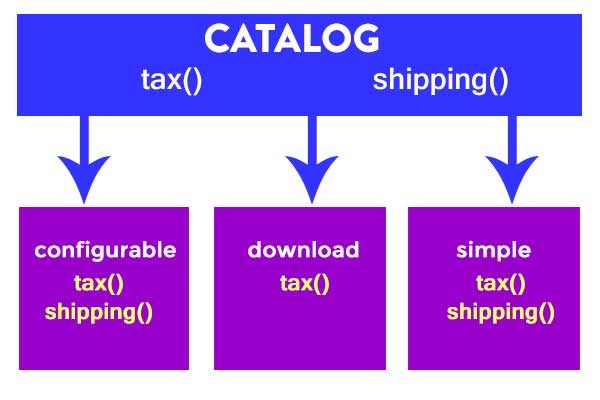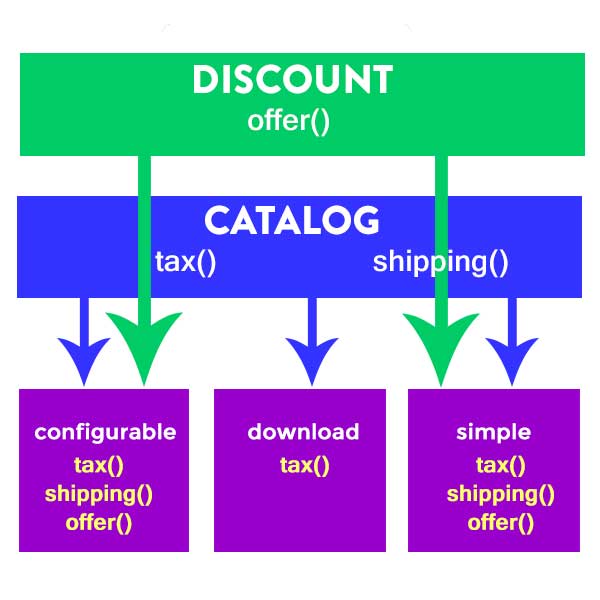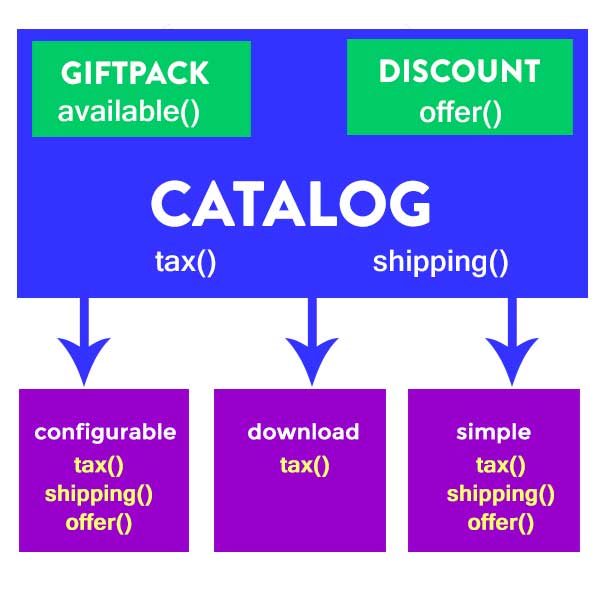Design philosophy of Golang interface type
Implementing a Go interface is done implicitly. In Go, there is no need to explicitly implement an interface into a concrete type by specifying any keyword. To implement an interface into a concrete type, just provide the methods with the same signature that is defined in the interface type.
An interface type is defined with the keyword interface. An interface defines a set of methods (the method set), but these methods do not contain code: they are not implemented (they are abstract). A method set is a list of methods that a type must have in order to implement the interface. Also an interface cannot contain variables.
An interface is declared in the format
Example
Interface Type catalog
type catalog interface {
shipping() float64
tax() float64
}
The interface type catalog is a contract for creating various product types in a catalog. The catalog interface provides two behaviors in its contract: shipping and tax.
Implementing an interface
The following source code shows the configurable type as an implementation of the interface type catalog. The configurable type is defined as a struct with receiver methods shipping and tax. This fact automatically qualifies configurable as an implementation of catalog:
Example
package main
import "fmt"
type catalog interface {
shipping() float64
tax() float64
}
type configurable struct {
name string
price, qty float64
}
func (c *configurable) tax() float64{
return c.price * c.qty * 0.05
}
func (c *configurable) shipping() float64{
return c.qty * 5
}
func main() {
tshirt := configurable{}
tshirt.price = 250
tshirt.qty = 2
fmt.Println("Shipping Charge: ", tshirt.shipping())
fmt.Println("Tax: ", tshirt.tax())
}
Output
Shipping Charge: 10
Tax: 25
Subtyping with Go interfaces
Go support composition (has-a) relationships when building objects using subtyping via interfaces. This can be explained that the configurable, download, simple type (and any other type that implements the methods shipping and tax) can be treated as a subtype of catalog, as shown in the following figure:

Example
package main
import "fmt"
type catalog interface {
shipping() float64
tax() float64
}
type configurable struct {
name string
price, qty float64
}
func (c *configurable) tax() float64{
return c.price * c.qty * 0.05
}
func (c *configurable) shipping() float64{
return c.qty * 5
}
type download struct{
name string
price, qty float64
}
func (d *download) tax() float64{
return d.price * d.qty * 0.07
}
type simple struct {
name string
price, qty float64
}
func (s *simple) tax() float64{
return s.price * s.qty * 0.03
}
func (s *simple) shipping() float64{
return s.qty * 3
}
func main() {
tshirt := configurable{}
tshirt.price = 250
tshirt.qty = 2
fmt.Println("Configurable Product")
fmt.Println("Shipping Charge: ", tshirt.shipping())
fmt.Println("Tax: ", tshirt.tax())
mobile := simple{"Samsung S-7",10,25}
fmt.Println("\nSimple Product")
fmt.Println("Shipping Charge: ", mobile.shipping())
fmt.Println("Tax: ", mobile.tax())
book := download{"Python in 24 Hours",19,1}
fmt.Println("\nDownloadable Product")
fmt.Println("Tax: ", book.tax())
}
Output
Configurable Product
Shipping Charge: 10
Tax: 25
Simple Product
Shipping Charge: 75
Tax: 7.5
Downloadable Product
Tax: 1.33
Multiple interfaces
In GO, the implicit mechanism of interfaces allows to satisfy multiple interface type at once. This can be implemented by intergrating the method set of a given type intersect with the methods of each interface type. Let us re-implement the previous code. New interface discount has been created. This is illustrated by the following figure:

Example
package main
import "fmt"
type catalog interface {
shipping() float64
tax() float64
}
type discount interface{
offer() float64
}
type configurable struct {
name string
price, qty float64
}
func (c *configurable) tax() float64{
return c.price * c.qty * 0.05
}
func (c *configurable) shipping() float64{
return c.qty * 5
}
func (c *configurable) offer() float64{
return c.price * 0.15
}
type download struct{
name string
price, qty float64
}
func (d *download) tax() float64{
return d.price * d.qty * 0.10
}
type simple struct {
name string
price, qty float64
}
func (s *simple) tax() float64{
return s.price * s.qty * 0.03
}
func (s *simple) shipping() float64{
return s.qty * 3
}
func (s *simple) offer() float64{
return s.price * 0.10
}
func main() {
tshirt := configurable{}
tshirt.price = 250
tshirt.qty = 2
fmt.Println("Configurable Product")
fmt.Println("Shipping Charge: ", tshirt.shipping())
fmt.Println("Tax: ", tshirt.tax())
fmt.Println("Discount: ", tshirt.offer())
mobile := simple{"Samsung S-7",3000,2}
fmt.Println("\nSimple Product")
fmt.Println(mobile.name)
fmt.Println("Shipping Charge: ", mobile.shipping())
fmt.Println("Tax: ", mobile.tax())
fmt.Println("Discount: ", mobile.offer())
book := download{"Python in 24 Hours",50,1}
fmt.Println("\nDownloadable Product")
fmt.Println(book.name)
fmt.Println("Tax: ", book.tax())
}
Output
Configurable Product
Shipping Charge: 10
Tax: 25
Discount: 37.5
Simple Product
Samsung S-7
Shipping Charge: 6
Tax: 180
Discount: 300
Downloadable Product
Python in 24 Hours
Tax: 5
Interface embedding
In GO, the interface type also support for type embedding (similar to the struct type). This gives you the flexibility to structure your types in ways that maximize type reuse.
Continuing with the catalog example, a struct configurable is declared in which the type discount and giftpack is embedded. Here you create more concrete types of the catalog interface. Because type giftpack and discount is an implementation of the catalog interface, the type configurable is also an implementation of the catalog interface. All fields and methods defined in the Type discount and giftpack types are also available in the configurable type.
The following illustration shows how the interface types may be combined so the is-a relationship still satisfies the relationships between code components:

Example
package main
import "fmt"
type discount interface{
offer() float64
}
type giftpack interface{
available() string
}
type catalog interface {
discount
giftpack
shipping() float64
tax() float64
}
type configurable struct {
name string
price, qty float64
}
func (c *configurable) tax() float64{
return c.price * c.qty * 0.05
}
func (c *configurable) shipping() float64{
return c.qty * 5
}
func (c *configurable) offer() float64{
return c.price * 0.15
}
func (c *configurable) available() string{
if c.price > 1000{
return "Gift Pack Available"
}
return "Gift Pack not Available"
}
type download struct{
name string
price, qty float64
}
func (d *download) tax() float64{
return d.price * d.qty * 0.10
}
func (d *download) available() string{
if d.price > 500{
return "Gift Pack Available"
}
return "Gift Pack not Available"
}
type simple struct {
name string
price, qty float64
}
func (s *simple) tax() float64{
return s.price * s.qty * 0.03
}
func (s *simple) shipping() float64{
return s.qty * 3
}
func (s *simple) offer() float64{
return s.price * 0.10
}
func main() {
tshirt := configurable{}
tshirt.price = 1550
tshirt.qty = 2
fmt.Println("Configurable Product")
fmt.Println("Shipping Charge: ", tshirt.shipping())
fmt.Println("Tax: ", tshirt.tax())
fmt.Println("Discount: ", tshirt.offer())
fmt.Println(tshirt.available())
mobile := simple{"Samsung S-7",3000,2}
fmt.Println("\nSimple Product")
fmt.Println(mobile.name)
fmt.Println("Shipping Charge: ", mobile.shipping())
fmt.Println("Tax: ", mobile.tax())
fmt.Println("Discount: ", mobile.offer())
book := download{"Python in 24 Hours",50,1}
fmt.Println("\nDownloadable Product")
fmt.Println(book.name)
fmt.Println("Tax: ", book.tax())
fmt.Println(book.available())
}
Output
Configurable Product
Shipping Charge: 10
Tax: 155
Discount: 232.5
Gift Pack Available
Simple Product
Samsung S-7
Shipping Charge: 6
Tax: 180
Discount: 300
Downloadable Product
Python in 24 Hours
Tax: 5
Gift Pack not Available
